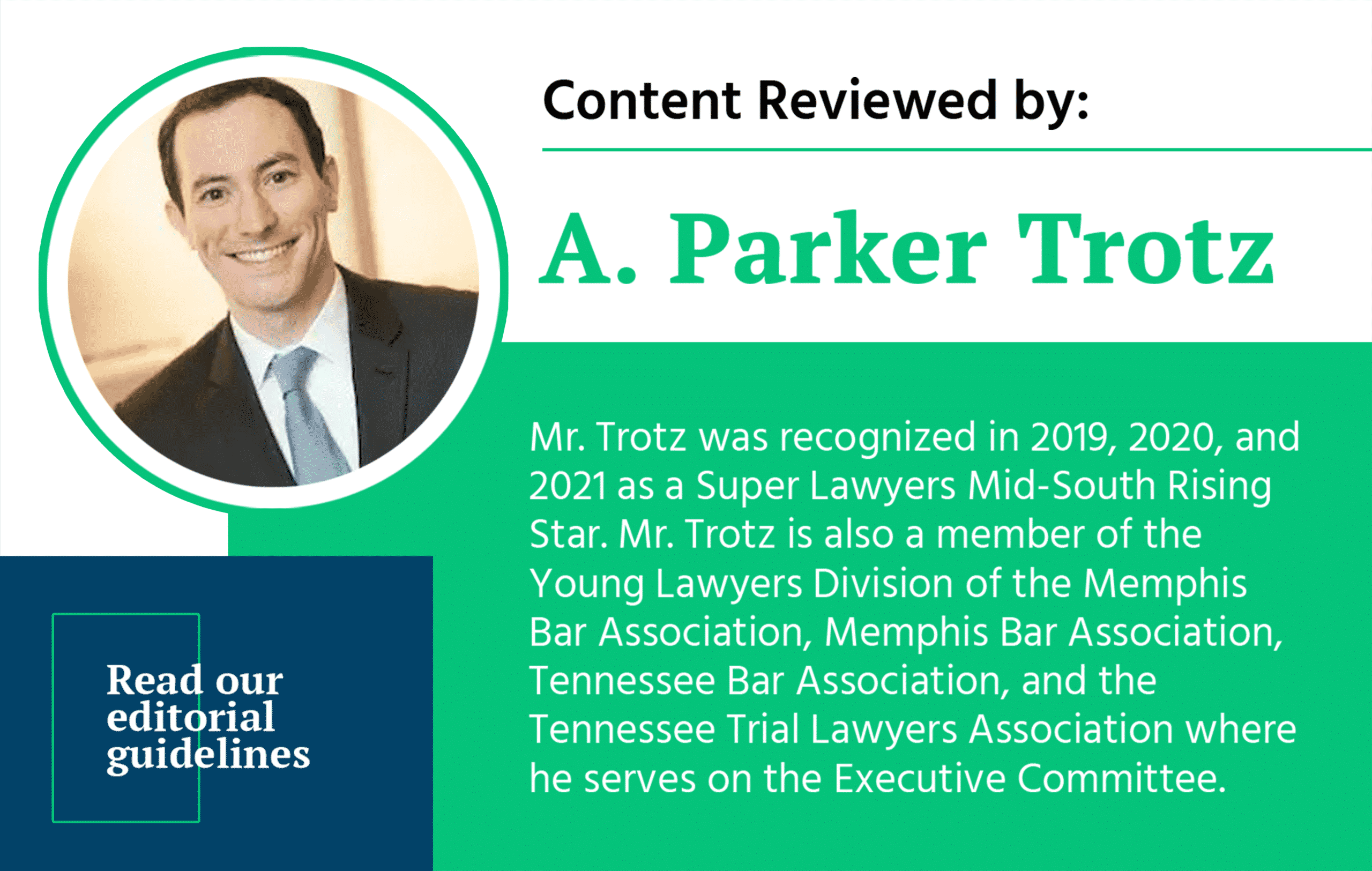Home » Memphis Personal Injury Lawyers » Memphis Negligent Security Lawyers
Memphis Negligent Security Lawyers
Mr. Trotz was recognized from 2019-2024 as a Super Lawyers Mid-South Rising Star. Mr. Trotz is also a member of the Young Lawyers Division of the Memphis Bar Association, Memphis Bar Association, Tennessee Bar Association, and the Tennessee Trial Lawyers Association where he serves on the Executive Committee. READ OUR EDITORIAL GUIDELINES
Mr. Trotz was recognized from 2019-2023 as a Super Lawyers Mid-South Rising Star. Mr. Trotz is also a member of the Young Lawyers Division of the Memphis Bar Association, Memphis Bar Association, Tennessee Bar Association, and the Tennessee Trial Lawyers Association where he serves on the Executive Committee. READ OUR EDITORIAL GUIDELINES
Personal Injury Lawyers Serving Tennessee and Beyond
The news reports are horrifying – mugging at popular shopping malls, brawls at crowded nightclubs, shootings at local apartment complexes, and more. When these incidents occur, innocent people are the ones who typically get hurt. Victims who survive an attack may suffer significant injuries from being involved in such a traumatic event, some of which may be life-altering. Serious injuries lead to unwanted medical bills, potential loss of income, and pain and suffering. Most people think the victim only has legal recourse against the perpetrator(s). However, depending on the facts and state law, liability may also rest with the property owner or party charged with looking after the premises. If you or a loved one was the victim of a third party criminal act at an apartment complex or place of business, call our Memphis inadequate security attorneys today. Nahon, Saharovich & Trotz is the largest plaintiff’s personal injury law firm based in Tennessee, and we have recovered more than $1.5 billion in compensation for our injured clients throughout the South in over 30 years of practice.
When a Property Owner or Manager Can Be Held Responsible for Criminal Acts on Their Property
Criminals who commit assault, rape, robbery, murder, or similar acts likely do not have the assets to fully compensate victims for everything they have gone through. If this is the case, a victim may have no choice other than to investigate whether the property owner took sufficient measures to provide security. States have specific guidelines concerning the duties that property owners owe to those on the property, and the duties can be narrow when it comes to criminal activity.
Tennessee law, for example, states a business may not bury its head in the sand when it comes to criminal activity afoot on the premises. Businesses, such as malls, shopping centers, office buildings, hotels, and apartment complexes, must take certain steps to keep visitors and tenants safe. If the owner is on notice of criminal activity, appropriate measures must be taken. Notice can be actual or constructive, and appropriate measures may include installing proper lighting, fixing broken locks, maintaining security equipment, and hiring guards.
Inadequate security cases in Tennessee and surrounding states often depend on foreseeability. Did ownership know of prior incidents? Was ownership aware of threats? Is the property located in a high-crime area? These are all relevant questions. For instance, if an apartment complex knew about a rash of break-ins on the property over a two-month period, one could argue it had a legal duty to take reasonable steps to prevent future attacks. This could include assigning a security guard to all entrance gates to ensure non-residents could not freely enter the complex. If it turns out that ownership failed to take steps to correct the issue, and a loved one was shot by a robber leaving the premises, for example, a claim may be established against the complex for negligent security.
In an inadequate security case, the burden of proving liability rests squarely on the plaintiff’s shoulders. That means the victim (or surviving beneficiaries in a wrongful death case) must show that the defendant property owner and/or manager breached a legal duty owed to him or her. Time is of the essence in these cases. Following an event such as an apartment complex shooting in the Memphis area, an inadequate security attorney can take steps to preserve critical evidence, such as surveillance footage, incident reports, and other records kept in the ordinary course of business. Contacting witnesses is also of utmost importance. Further, your attorney can monitor the perpetrator’s case in criminal court. Information and testimony from that case could go a long way in satisfying the legal burden in your civil case.
Damages caused by inadequate security have the potential to be catastrophic. Physical injuries can include broken bones, traumatic brain injury, or paralysis, full or partial. Emotional losses are likely to be significant as well, as it is never easy being the victim of a crime. In this type of lawsuit, victims may be able to recover economic damages such as medical bills, future medical costs, lost wages, diminished earning capacity, and other out of pocket expenses. Non-economic losses like pain and suffering, emotional distress, loss of enjoyment of life, and loss of consortium count too. If the victim passed away, wrongful death laws will come into play. If discovery reveals that the defendant acted intentionally, maliciously, recklessly, or fraudulently, punitive damages may be awarded.
Speak with an Experienced Inadequate Security Lawyer in Memphis Today
Negligent security can occur for a variety of reasons. Maybe the property owner wants to keep costs down and is deliberately placing profits over people. Maybe they are understaffed. Or, maybe they simply do not have the structure or organization in place to adequately respond to threats. Nevertheless, injured victims do have rights, but you will need aggressive legal representation on your side to sort through the facts and identify the evidence needed to win your case. Nahon, Saharovich & Trotz is ready to take your call today and discuss how we may be able to help. We serve victims and their families throughout Tennessee, as well as in Arkansas, Kentucky, Mississippi, and Missouri. Many of our firm’s clients have come from cities such as Memphis, Nashville, Knoxville, Chattanooga, Jonesboro, Little Rock, Jackson, Meridian, Tupelo, Columbus, Grenada, Starkville, Oxford, Hayti, and Caruthersville. Call NST at 800-529-4004 or complete our online form to set up a free consultation. If you were injured at a shopping center or other place of business and need a Memphis inadequate security attorney, NST is the way to go.
Our Memphis Office
Nahon, Saharovich & Trotz Personal Injury Attorneys
488 S. Mendenhall Road
Memphis, TN 38117
Phone: 901-683-7000
Hours Available: Call 24/7


